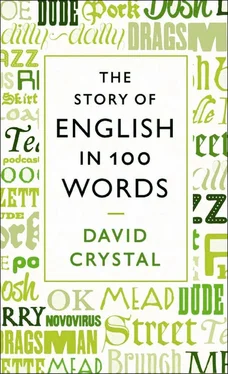The internet has also favoured a previously rare phenomenon called bicapitalisation (the use of a capital in the middle as well as at the beginning of a word), notably in company names. We find Alta-Vista , not Altavista — and similarly, AskJeeves, CompuServe, DreamWorks and GeoCities . Three capitals occur in QuarkXPress and aRMadillo Online . Sometimes just a middle capital is used, as in the i -prefix usages which have produced iMap, iPhone, iMac, iPad and other innovations — a pattern which has been picked up and used in a wide range of contexts, such as iDrugs, iDosing, iForms, i-Routes, iSense and hundreds more.
Domain names are likely to turn the world of lexicography upside down. Virtually every word in everyday English has now been bought, to be used as a domain name. Familiar compounds have gone the same way. To invent a new domain name these days you have to be really ingenious and play with spelling or unusual sequences, such as inventinganewword.com . These are all proper names, of course, so they don’t really count when it comes to vocabulary. But an unknown (and, I suspect, large) number will eventually develop general uses, in much the way that place-names have ( §80). Do you wiki? Are you in a Mac-forum? Have you been Amazoned yet?
 92. App — a killer abb (20th century)
92. App — a killer abb (20th century)
In 1985 a writer in the trade newspaper Information World , describing a new kind of on-screen menu, used an abbreviation — and then felt he had better explain it: ‘apps’, he wrote, adding ‘for applications’.
Most people would have needed an explanation at the time. The idea of an application — a computer function designed to meet a specific user requirement — had been around for over twenty years, but shortening it to app was a novelty. The word had never been abbreviated in that way before. It immediately caught on. There was something phonetically appealing about the short, perky syllable, which seemed to suit the exciting quickfire developments in digital communication of the time. And soon after, the idea of a killer app arrived — a function which, in the dreams of the multimedia industry, would be so appealing or superior that people wouldn’t be able to do without it. If any word should achieve the status of a killer abb(reviation), it is this one.
There’s nothing new about abbreviations, of course. They’ve been in English since its earliest days ( §3). But the Anglo-Saxon scribes could hardly have predicted the extraordinary increase in shortened words and names that has taken place over the past century or so. One collection ( §79) has over half a million abbreviations, with new editions adding thousands more each year. And no wordbook should ignore the way that electronic media generally, and the internet in particular, have become one of the most fruitful sources of present-day growth, especially in abbreviations consisting only of initial letters ( acronyms ) — GPS (‘global positioning system’), SMS (‘short messaging service’), FAQs (‘frequently asked questions’) and so on. Most are short — three letters is the norm. Just occasionally we encounter longer sequences, such as WYSIWYG (‘what you see is what you get’), or some of the humorous strings found in text-messaging, such as ROTFLMAO (‘rolling on the floor laughing my ass off’).
How many of these will last? Many, especially those used in texting, are likely to have a short life ( §94). But app seems a safe bet for a permanent place in the language. The number of apps are now in the hundreds of thousands, and mobile phones are increasingly the technology of choice for internet connection, so this is plainly an abbreviation that is not going to go away. Who would use four syllables ( applications ) in everyday speech when they can use one?
 93. Cherry-picking — corporate speak (20th century)
93. Cherry-picking — corporate speak (20th century)
This chapter is going to bring to the table a brain-dump of buzzworthy outcomes.
By close of play you’ll have seen the value-added, the wow factor, of this joined-up state-of-the-art, blue-sky thinking. It’ll be a no-brainer, a win-win situation, a foot-on-the-ball result. I’ll be thinking out of the box. I’ll cherry-pick the low-hanging fruit so that you’ll see cutting-edge practice. Think synergy. Think mission. The bottom line is you’ll take ownership of my visioning.
Cherry-pick , meaning ‘choose selectively the most beneficial courses of action’, is, like many other pieces of business jargon, a development of the 1960s. My pastiche is not unlike the ‘corporate speak generators’ that can be found online, producing strings of humorous nonsense — the humour, of course, lying in the fact that the results are uncomfortably close to the realities of what is daily heard and read in many offices.
What is going on? It isn’t just a matter of jargon. Every profession, trade or social group has its special language — the technical terms, abbreviations and idioms which show that you are an electrician, lawyer, priest, journalist, doctor… To insiders, these terms are unproblematic: they define their professionalism. People only start condemning such language as jargon when the insiders talk to outsiders in an unthinking or pretentious way, using obscure words without considering the effect on their listeners.
Corporate speak is more than jargon. While such terms as synergy, incentivise and leveraging can be difficult to grasp, there’s nothing especially hard about wow factor , low-hanging fruit or (at least to cricket fans) close of play . But these phrases nonetheless attract criticism. The charge is that, even though they are simple, they have lost their meaning through overuse. They have become automatic reactions, verbal tics, a replacement for intelligent thinking. In short, they have become inappropriately used clichés.
These days the charges come from both inside and outside the world of business management. And the criticisms are particularly harsh when other domains pick up corporate speak. Government departments especially have to be careful if they lapse into it. A UK parliamentary select committee in July 2009 examined the matter, and the chairman introduced the topic using another pastiche:
Perhaps I could say, by way of introduction, welcome to our stakeholders. We look forward to our engagement, as we roll out our dialogue on a level playing field, so that, going forward in the public domain, we have a win-win step change that is fit for purpose across the piece.
Everyone in the room recognised the symptoms. And the subsequent discussion focused on the kinds of language routinely being used in government circles, such as unlocking talent, partnership pathways, a quality and outcomes framework and best practice flowing readily to the frontline . What could be done about it?
It’s easier to identify symptoms than to suggest cures. And it’s easy to parody. Eradicating habitual usage is hard. But there is a mood around these days that something has to be done. Whether in business or in government, recognising models of good practice, and rewarding them, will be an important first step.
 94. LOL — extspeak (20th century)
94. LOL — extspeak (20th century)
When LOL first appeared on computer and mobile phone screens, it caused not a little confusion. Some people were using it to mean ‘lots of love’. Others interpreted it as ‘laughing out loud’. It was an ambiguity that couldn’t last. Who knows how many budding relationships foundered in the early 2000s because recipients took the abbreviation the wrong way? Today it’s settled down. Almost everyone now uses LOL in its ‘laughing’ sense. And it’s one of the few text-messaging acronyms to have crossed the divide between writing and speech.
Читать дальше

 92. App — a killer abb (20th century)
92. App — a killer abb (20th century) 93. Cherry-picking — corporate speak (20th century)
93. Cherry-picking — corporate speak (20th century) 94. LOL — extspeak (20th century)
94. LOL — extspeak (20th century)










